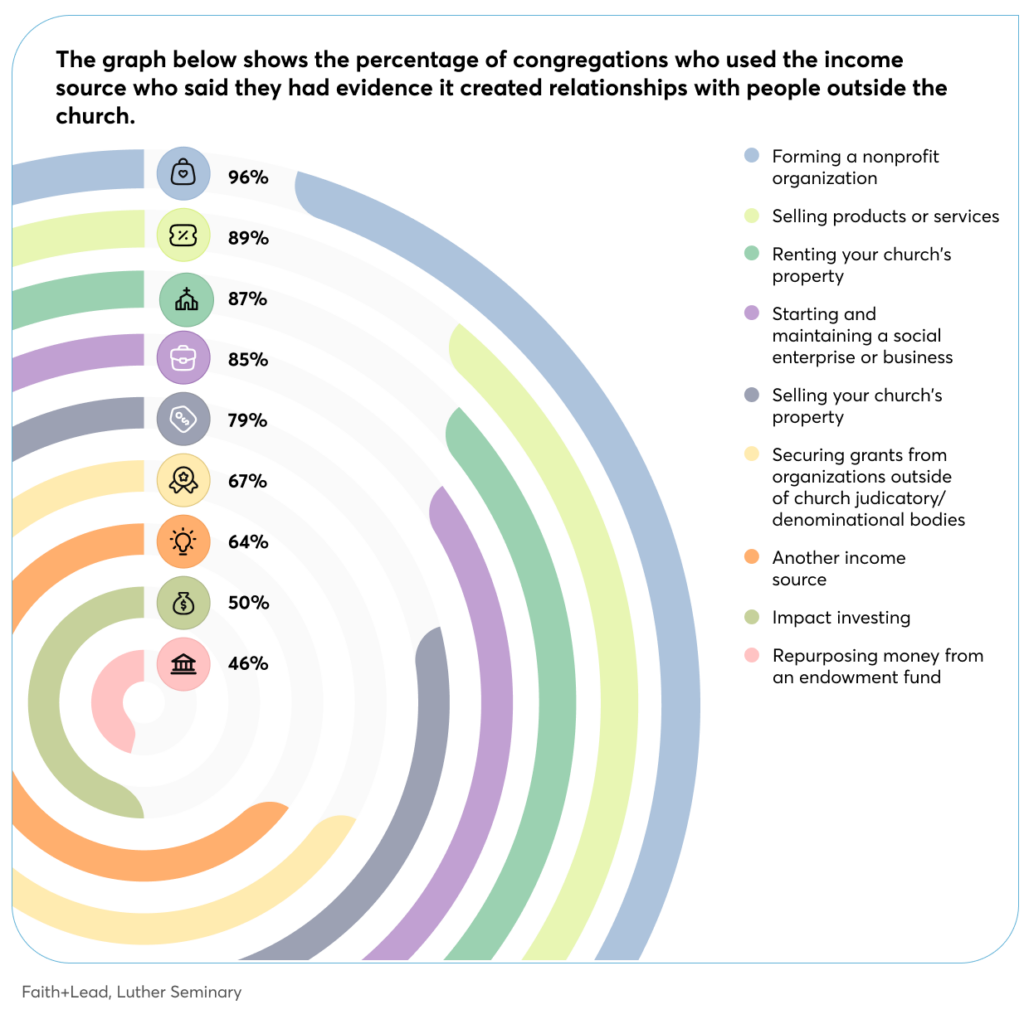Throughout fall 2023, I was pleased to have the opportunity to speak with groups online and in-person about the Funding Forward Research Project and how they could find more economically sustainable models for ministry that help them live deeper into their congregation’s mission. While I received a lot of detailed questions about tax implications on renting out church property, what faith-based grants might be available for specific projects, and more, one question that always seemed to come up near the end of my time with a group was this: Will Funding Forward increase my church’s attendance?
My answer: Maybe?
If you had asked me this question before completing the research project I would have honestly said, “no.” I didn’t think shifting the church funding model would have much of an impact on church attendance. I also didn’t think trying to get more butts in seats on a Sunday morning was a very good reason to shift the model – anyone from outside of the congregation would likely see this self-serving motivation a mile away and be unlikely to want to partner with you.
That being said, I was surprised to hear from some of the congregations in the interview process that the changes they made to their church’s funding model had increased attendance, but not in the way they expected. For instance, one of the congregations we interviewed, First Presbyterian Church of Gulf Shores in Gulf Shores, Alabama, rents out rooms in their church as affordable offices for people in their community. There were congregation members who assumed that the people who rented the space during the week would begin coming to church on Sunday morning. This has not happened. However people from the community who heard about how the church was serving the community during the week, saw the church’s sign inviting people to “ Come Share Our Space,” who said “Wow, I want to be a part of a church like that” and ended up attending the church.
While this was the case for First Presbyterian Church of Gulf Shores, this was not the case for many of the other interview sites we connected with. Too often, I think congregations have confused loving God and neighbor with loving their buildings and fellowship with other members. They have sustained the church for the sake of those inside the building on Sunday morning rather than those who aren’t there yet. I have seen church leaders come to Funding Forward with the same attitude. Maybe if we rent out our church’s space, start a social enterprise, or receive a grant to fund the status quo for a few years longer, we’ll get a few more members whose giving will offset our need to use those other income sources. We are more focused on saving the church than spreading the gospel.
While there are no guarantees that shifting your church’s funding model will increase church attendance, we did see a remarkable trend that many of the 100+ congregations we surveyed experienced. They had evidence that their new income sources helped create relationships with people in the community they may never have met otherwise! This was especially true for those forming a non-profit organization (96%), selling products or services (89%), renting church property (87%), starting a business or social enterprise (85%), and even those selling church property (79%).

In the words of one of the survey participants:
“An average of over 700 people travel through our doors each week for programming and services provided by our ministry partners. We have built strong relationships with both the leaders of these groups and participants. While these folks may not worship at [our church] they do see [our church] as home.”
In the words of another survey participant:
“The relationships are bilateral. Folks need [the] space we provide and we benefit from their contributions. I am now challenging the congregation to recognize the importance of relationships with our community guests as a matter of being church in the community (unconditional or radical hospitality) rather than expecting that somehow because they have been in the building folks will arrive at a place where they want to attend the church as members of the congregation as well.”
Most “nones” (those with no religious affiliation) and “dones” (those who have stopped attending church) do not see a church building as a beacon of hope in the community; rather, they are suspicious of churches as they wonder whether religion has done more harm than good.
But, what if…
- our first step in sharing the gospel with our neighbors is to embody hospitality and love for our neighbors without asking for anything in return?
- we prayerfully and intentionally set the table for God to act without letting our own fears and insecurities about our church’s financial future get in the way?
In the words of Jonny Baker, Britain Hub mission director at Church Mission Society, “you’ve got to be good news, if you want to talk about good news” in your neighborhood today.
Will Funding Forward increase your church’s attendance? I don’t know.
Will Funding Forward help you be good news to your neighborhood? Yes, absolutely!
If you’re looking for ways to create new relationships in your community and join the work God is already doing in your neighborhood, join us for the Funding Forward webinar on January 23rd at 1pm (Central) or January 29th at 7pm (Central) where we will take a closer look at why tithes and offerings may no longer be enough to fund your church’s mission and what the mission-driven pathway to a more sustainable model might look like for your congregation.
Interested in hearing more? Download a free chapter from Grace’s new book, Funding Forward, to find pathways to more sustainable ministry models.



